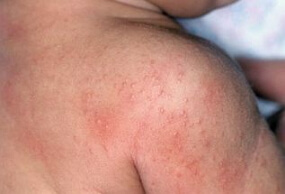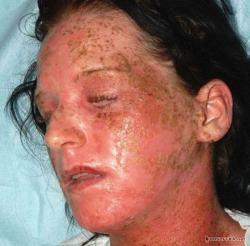Antihistamines - Generations, principles of action, drug review
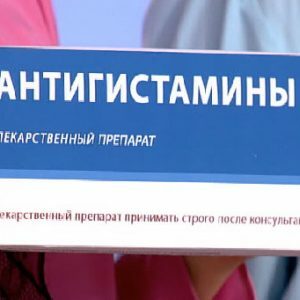
According to medical statistics, the number of allergic reactions is steadily growing - this is associated with the permanent deterioration of the ecological situation and a decrease in immunity in the conditions of civilization.
Allergy is a reaction of the hypersensitivity of an organism to a foreign substance( allergen).Such external allergens can be any external and internal stimulus - food, animal hair, viruses, dust, vaccines, pollen, sun, bacteria, medicines and much more.The body's response to the ingestion of an allergen will be intensive development of histamine - this is a special substance that causes an allergic reaction.
Note: if you remove the allergen from a person's life, then all the symptoms of an allergic reaction will disappear.But the problem is that immunity "remembers" this allergen and its secondary penetration into the body can cause a powerful, sometimes deadly, reaction.
The principle of the action of antihistamines The first generation of antihistamines - sedativeThe principle of the action of antihistamines
Everything is quite simple: this kind of drugs block histamine receptors, which causes the symptoms of allergy to subside - the rash pale and then completely disappears, Nasal breathing is restored, itching and burning become less noticeable, the phenomena of conjunctivitis come to naught.
The very first antihistamines( antiallergic) drugs appeared in the 30s of last century.Science and medicine are constantly evolving, so over time, these same means of the second and third generation appeared.To date, doctors use all three generations of antiallergic drugs, but there are also the most popular of all available.
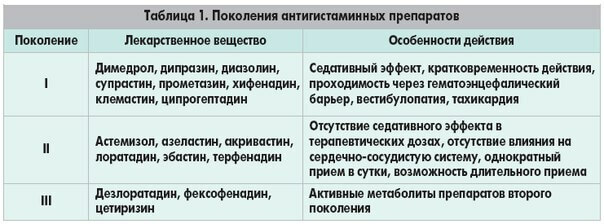
The first generation of antihistamines - sedative
Such drugs cause a sedative, hypnotic and depressing effect, but each drug of this group will have different severity of such effects on the body.It is especially worth noting that antihistamines of the first generation have too short a period of action - a person gets relief in just 4-8 hours.In addition, the shortage of the medicines under consideration is that the organism too quickly becomes accustomed to them.
Despite the obvious shortcomings of antihistamines of the first generation, they remain popular, as they are considered time tested, and the cost of them pleases.By doctors, the drugs in question are often prescribed not only for the removal of allergic manifestations, but also for intensive itching against the background of cutaneous infectious pathologies, to prevent the risk of post-vaccination complications.
First-generation antihistamines can cause a number of side effects:
- pronounced dryness of mucous membranes;
- increased thirst;
- drop in blood pressure;
- increased appetite;
- increased heart rate;
- indigestion - nausea, vomiting and discomfort in the stomach.
Please note: first-generation drugs under consideration are never assigned to people whose work is associated with increased attention( pilots, drivers), as a side effect may be a decrease in muscle tone and poor concentration of attention.
Suprastin
This preparation is available in the form of tablets and in ampoules, is considered the most popular antihistamine drug, is used to treat seasonal / chronic colds, hives, eczema, allergic dermatitis and Quincke edema.
Suprastin perfectly removes the itching, speeds up the process of getting rid of skin rashes.This drug is approved for the treatment of infants( from the age of 30 days), but the dosage should be selected in strictly individual order - the doctor will take into account the age and weight of the baby.
This antihistamine is used as a component of complex therapy against chickenpox( relieves itching), is part of the "triad" - a substance used to reduce body temperature.
Note: Suprastin is categorically contraindicated for use by pregnant women and women who are in the period of lactation.
Tavegil
It is used in the same cases as suprastin.It has a long antihistamine effect - the effect lasts 12 hours.Tavegil does not cause a decrease in blood pressure, and the hypnotic effect is less pronounced in it than in Suprastin.
In childhood, the drug in question is used from 1 year - babies are prescribed syrup, and children over 6 years of age can also take pills.The dosage is selected by the attending physician, taking into account the age and weight of the patient.
Note: Tavegil is strictly prohibited for consumption during pregnancy.
Fenkarol
This drug antihistamine effect is more prolonged, as it not only blocks the histamine receptors, but also triggers a specific enzyme that is capable of utilizing histamine.Fenkarol does not cause a hypnotic and sedative effect, can be used as an antiarrhythmic drug.
This antiallergic drug is used to treat all kinds of allergies, it is especially valuable in the treatment of seasonal allergies.Fenkarol is a part of complex therapy for Parkinsonism, it is used in surgery as well - they are given drug preparation for anesthesia.
In childhood, this drug is prescribed from 12 months, it is desirable to give the kids a suspension that has an orange taste.Dosage and duration of the drug is determined by the attending physician.
Note: Fenkarol is strongly contraindicated in the first trimester of pregnancy, and in the second and third trimester can be used to treat allergies only under the supervision of a specialist.
Fenistil
This medication is used to treat:
- of all kinds of allergies;
- chickenpox( relieves itching);
- rubella.
Fenistil causes drowsiness only at the very beginning of treatment, after just a few days the sedative effect disappears. Fenistil has several side effects:
- pronounced dryness of the oral mucosa;
- dizziness;
- muscle spasms.
This product is available in the form of tablets, drops for children, gel and cream.The latest pharmacological forms of Fenistil are used for insect bites, contact dermatitis and sunburn.
Children Fenistil is prescribed from a month's age in the form of drops, if the patient is over 12 years of age, then he is prescribed tablets. Note: during pregnancy Fenistil can be used as a gel and drops; from the second trimester, such appointments can only take place if there are conditions threatening the woman's life - Quincke's edema, acute food allergy. Distinguished by low antihistaminic activity, but it has a lot of side effects: Diazolin has a certain advantage - it does not cause drowsiness, so it can be prescribed to treat allergic reactions in pilots and drivers.The duration of the antiallergic effect of the drug in question is a maximum of 8 hours. For children Diazolin can be prescribed from 2 years, up to 5 years it is better to give children a drug in the form of a suspension, older can be offered and tablets. Note: Diazoline is categorically contraindicated for admission in the first trimester of pregnancy. Despite the fact that antihistamines of the first generation have a lot of shortcomings, they are actively used in medical practice: each drug is well studied, in most cases they are allowed for use by children. They are called non-sedative, have a pronounced antihistamine effect, the duration of which often reaches 24 hours.Such medications are taken once a day, do not cause drowsiness and disturbance of attention. Most often these drugs are used to treat eczema, urticaria, Quincke's edema and hay fever.Quite often antihistamines of the second generation are used in the treatment of chicken pox - they perfectly relieve the itching.The distinctive advantage of this group of drugs is that they are not addictive.There is also a nuance in the use of second-generation anti-allergic drugs - they are not recommended for elderly people and those who have a history of heart disease. The drug acts on the histamine receptors selectively, which allows you to achieve a rapid effect.Produced in the form of tablets and syrup, can be realized under the name "Claritin" or "Lomilan".Syrup is very easy to dose and give to children, and the effect of the drug begins to manifest itself within an hour after ingestion. In childhood, Loratadin is prescribed from 2 years, dosage and duration of admission should be selected only by the attending physician. Note: is not recommended for prescribing an antihistaminic drug in the early stages( up to 12 weeks).In extreme cases, the use of Loratadin should necessarily be carried out under the supervision of a specialist. The drug is characterized by a number of pronounced advantages of : In pediatric practice, Kestin has been used since the age of 12, but is capable of exerting toxic effects on the liver and reducing the heart rate. Kestin is absolutely contraindicated in pregnancy. The drug is most often used to treat urticaria, after ingestion it is quickly absorbed, and simultaneous eating significantly enhances the effect of Rupafin. This drug is not used for children under 12 years of age and pregnant women.If the use of the drug in children who are breastfed is required, then this is possible only under strict medical supervision. The second generation antihistamines fully meet the modern requirements that are imposed on medicines - they are highly effective, have a long-lasting effect, are easy to use.It should be remembered that these drugs should be taken in a strictly prescribed dosage, because exceeding it leads to drowsiness and increased side effects. It should be noted right away that it is possible to meet the division of antihistamines into the third and fourth generation - it is rather conditional and carries nothing but a beautiful, effective marketing slogan. Antihistamines of the third generation are the most modern, they have no sedative effect, they do not affect the functioning of the heart.Such drugs are actively used to treat allergies, dermatitis, even in children and people with cardiac pathologies in history. Allegra, Cetirizine, Xizal and Desloratadine are these preparations and refer to the antiallergic drugs of the third generation.All these means should be used very carefully by pregnant women - most of them are contraindicated.In addition, you must strictly follow the prescribed dosage, as its excess can result in the appearance of headache, dizziness and too frequent heartbeats. Antihistamines should be prescribed by a doctor, he will also choose the dosage, give recommendations regarding the duration of the course of treatment.If the patient breaks the treatment scheme, it can trigger not only the appearance of side effects, but also an increase in the allergic reaction. Tsygankova Yana Aleksandrovna, medical reviewer, therapeutist of the highest qualification category Diazolin
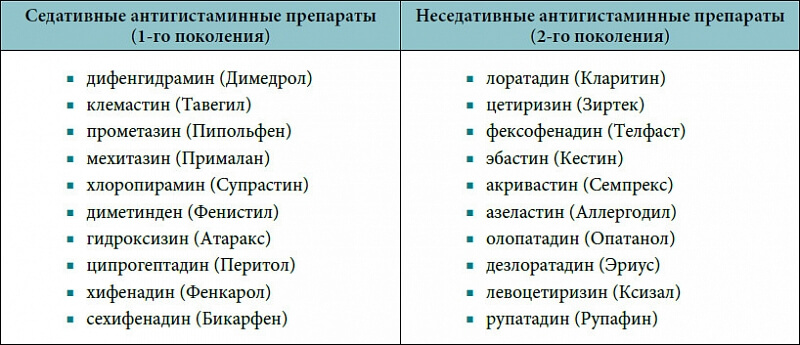
Second-generation antihistamines
Loratadin
Kestin
Rupafin
Anti-histamines of the third generation


